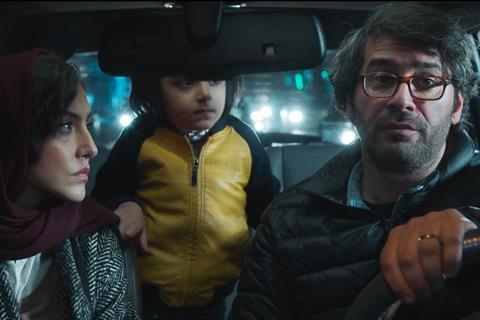A young boy’s refusal to speak turns family life on its head in this Transilvania-winning drama from Iran

Dir/scr: Dornaz Hajiha. Iran. 2022. 78mins
A child’s stubborn silence gradually exposes the cracks in a seemingly happy household in Like A Fish On The Moon . Dornaz Hajiha’s modest but promising debut feature is an intriguing, well-acted family drama marked by its restrained handling. The refusal to answer some of the questions it raises may frustrate some, but adds to the air of mystery surrounding the challenges facing the silent boy and his parents. A busy festival run that began at Karlovy Vary in 2022 continues to reap rewards, including a performance award and the Transilvania Trophy at the Transilvania Film Festival.
Immerses us in the struggle to deal with a world turned upside down
Like A Fish begins in a psychiatrist’s office. Concerned parents Haleh (Sepidar Tari) and Amir (Shahdiyar Shabika) have sought professional help to understand why their four year-old son Ilya (Ali Ahmadi) has chosen to stop speaking. The boy sits before them absorbing the conversation. His big brown eyes are wide and innocent. His features are haloed with a bird’s nest of hair. Is he playing a trick on them? Is he trying to punish them?
The unseen psychiatrist turns his attention to the couple’s seven-year marriage and their parenting skills. They describe themselves as just a “regular couple living together”. The persistent psychiatrist eventually discovers that Haleh takes responsibility for the majority of child care and Amir does his best either end of his working day. Perhaps she has been too protective and he has been too neglectful? He suggests reversing their roles so that Haleh takes charge of everything his wife would normally do. It sounds like the premise of an old-fashioned Hollywood screwball comedy with daddy day care suddenly overwhelmed by his unaccustomed responsibilities, but Hajiha plays it much more seriously, revealing the ways in which this becomes a burdensome, upsetting arrangement for both of them.
Haleh and Amir run the gamut from pleading to punishment in a bid to make Ilya speak, but it is the impact on their relationship that lies at the heart of the film. Accusation, exasperation and recrimination all take their toll on a union that once seemed unbreakable. Hajiha asserts her control over the story by emphasising how the family are isolated and confined. Conversations against the stark backdrop of the psychiatrist’s office look more like a police interrogation. Apart from a rare, disastrous trip to the seaside, every other location feels like a place from which there is no escape – the interior of their home, inside their car, at a hospital or school where they are under the scrutiny of others.
There is a constant sense that they are alone in this; nobody else seems able to help or understand, despite Haleh’s constant requests for second opinions and fresh tests. Throughout, Hajiha carefully balances the direction of our sympathies. Haleh initially feels like the wronged partner who has been left to do everything for her son. Then we start to question whether she has mollycoddled him, and even prevented him from doing things he is perfectly capable of doing for himself.
Largely drained of colour, the film unfolds as a social realist drama which makes the sudden burst of Vivaldi’s ’Four Seasons’ on the soundtrack feel like a jarring flamboyance. The performances are suitably understated and measured. Tari captures the weary exasperation of a woman ground down by her frustrations; she even seems to fade during the course of the film, growing paler and more anguished as dark circles spread under her eyes. Architect turned actor Shabika is equally convincing as the husband, while Ali Ahmadi is suitably enigmatic as Ilya.
Hajiha never explains the film’s title, never provides any convenient backstory of trauma or revealing flashbacks of family life. Instead, she immerses us in the struggle to deal with a world turned upside down, and leaves the viewer to reach their own conclusions.
International sales: Asian Shadows maria@chineseshadows.com
Producer: Ehsan Rasoulof
Cinematography: Alireza Barazande
Editing: Ashkan Mehri
Main cast: Sepidar Tari, Shahdiyar Shabika, Ali Ahmadi





















